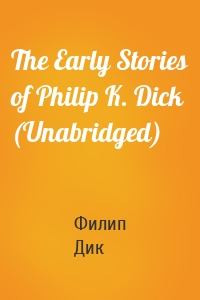Филип Дик
156 кн.
The Skull (Unabridged)
In The Skull, a convict is offered his freedom if he agrees to travel back in time and kill someone. He learns that the assasination target was the founder of a religious sect that grew in strength and influence from its inception in 1960. Carrying his target's skull so he can identify the religious leader, the convict comes to learn a terrible secret about why he was chosen to find its owner.
| Автор | Филип Дик |
Mr. Spaceship (Unabridged)
In Mr. Spaceship, humans in the distant future are at war with alien life forms known as Yuks. Using outdated, mechanical machines to wage war against the life-based weapons of the advanced Yuks, a research team decides to build a spaceship powered by a human brain. Enlisting a dying professor who agrees to donate his brain to the project, the humans believe they have turned the tables on the Yuks. But the spaceship has other plans.
| Автор | Филип Дик |
The Gun (Unabridged)
In The Gun, a group of space explorers are shot down above a deserted planet. While some of the crew work on repairing the ship, the remainder set out to investigate the planet. Otherwise unpopulated, they discover the huge gun that shot them down sitting atop a trove of cultural artifacts from a bygone civilization. What harm could come of dismantling the gun and taking a few of the artifacts home with them?
| Автор | Филип Дик |
Second Variety (Unabridged)
In Second Variety, UN forces have retreated to a moon base in the aftermath of early Soviet victories in a nuclear conflict. In response, the UN forces developed special robots, called Claws, which feature spinning blades and rudimentary artificial intelligence. Six years later, the Soviet leadership asks for negotiations to end the war. A UN officer travels back to earth to discover that not only have the Claws learned to replicate themselves, they have also created a much deadlier cyborg that...
| Автор | Филип Дик |
The Variable Man (Unabridged)
In The Variable Man, Earth (The Terran System) is in a cold war with the older, corrupt Centaurian System, suppresses Terra from exploring space and expandig its borders. When a devastating new weapon called Icarus is developed by Terra, everyone expects the odds to tip in Terra's favor. But the computers calculating these odds find an unknown variable that throws off the odds. A time traveler from 1913, known as Thomas Cole has arrived. Can this variable man from the past rescue mankind...
| Автор | Филип Дик |
The Eyes Have It (Unabridged)
"The Eyes Have It" is a humorous, early short story by Philip K. Dick that first appeared in Science Fiction Stories in 1953. In it, a bus-riding reader of a discarded melodrama with an overactive imagination is persuaded by the hackneyed prose that the world has been taken over by aliens. Thus, when «eyes slowly roved around the room», the reader imagines disembodied eyeballs traveling of their own free will. A rare example of satire from the Dick canon.
| Автор | Филип Дик |
The Early Stories of Philip K. Dick...
Every legend has a beginning. Dreamscape Media presents a collection of thirteen early short stories penned by Philip K. Dick. Exploring themes of authoritarianism, alternate universes, and altered consciousness, the stories (including The Variable Man, Second Variety, and The Defenders) first appeared in American science fiction magazines of the 1950s and earned him the respect of such peers as Robert Heinlein and Ursula LeGuin, as well as the adulation of a voracious readership.
| Автор | Филип Дик |
Beyond Lies the Wub (Unabridged)
In Beyond Lies the Wub, the crew of a spaceship buys a wub, a large pig-like animal from a native martian to eat on the way home. The Wub turns out to be a sentient being capable of intelligent conversation, empathy, and possibly telepathy and mind control. When a crew member converses with the remarkable Wub, the captain makes a rash and violent decision that could put the return mission in danger.
| Автор | Филип Дик |
Beyond the Door (Unabridged)
In Beyond the Door, a man buys a cuckoo clock for his wife who has always wanted one. When he catches her cheating on him, the man throws his wife out of the house with her lover. Though he never really cared for the clock, he keeps winding it because he dislikes the silence. But the cuckoo clock, who preferred the wife's company, begins to plot against its owner.
| Автор | Филип Дик |
Tony and the Beetles (Unabridged)
In Tony and the Beetles, ten-year old Tony Rossi, an Earthman growing up on Betelgeuse, becomes aware that the natives, known as the Pas-Udeti, are driving out the Earthmen colonists on nearby Orion. His father, a staunch believer in the superiority of Earthmen, describes Tony's native friends as Beetles. A trip into town to meet his native friends leads to awkward encounters with a Pas-Udeti cab driver and a fellow bus passenger. When his newly aggressive Pas-Udeti friends rebuke him, Tony...
| Автор | Филип Дик |













